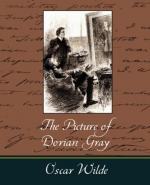“No, Basil, you must tell me,” murmured Dorian Gray. “I think I have a right to know.” His feeling of terror had passed away, and curiosity had taken its place. He was determined to find out Basil Hallward’s mystery.
“Let us sit down, Dorian,” said Hallward, looking pale and pained. “Let us sit down. I will sit in the shadow, and you shall sit in the sunlight. Our lives are like that. Just answer me one question. Have you noticed in the picture something that you did not like?— something that probably at first did not strike you, but that revealed itself to you suddenly?”
“Basil!” cried the lad, clutching the arms of his chair with trembling hands, and gazing at him with wild, startled eyes.
“I see you did. Don’t speak. Wait till you hear what I have to say. It is quite true that I have worshipped you with far more romance of feeling than a man usually gives to a friend. Somehow, I had never loved a woman. I suppose I never had time. Perhaps, as [57] Harry says, a really ‘grande passion’ is the privilege of those who have nothing to do, and that is the use of the idle classes in a country. Well, from the moment I met you, your personality had the most extraordinary influence over me. I quite admit that I adored you madly, extravagantly, absurdly. I was jealous of every one to whom you spoke. I wanted to have you all to myself. I was only happy when I was with you. When I was away from you, you were still present in my art. It was all wrong and foolish. It is all wrong and foolish still. Of course I never let you know anything about this. It would have been impossible. You would not have understood it; I did not understand it myself. One day I determined to paint a wonderful portrait of you. It was to have been my masterpiece. It is my masterpiece. But, as I worked at it, every flake and film of color seemed to me to reveal my secret. I grew afraid that the world would know of my idolatry. I felt, Dorian, that I had told too much. Then it was that I resolved never to allow the picture to be exhibited. You were a little annoyed; but then you did not realize all that it meant to me. Harry, to whom I talked about it, laughed at me. But I did not mind that. When the picture was finished, and I sat alone with it, I felt that I was right. Well, after a few days the portrait left my studio, and as soon as I had got rid of the intolerable fascination of its presence it seemed to me that I had been foolish in imagining that I had said anything in it, more than that you were extremely good-looking and that I could paint. Even now I cannot help feeling that it is a mistake to think that the passion one feels in creation is ever really shown in the work one creates. Art is more abstract than we fancy. Form and color tell us of form and color,—that is all. It often seems to me that art conceals the artist far more completely than it ever reveals him. And so when I got this offer from Paris I determined to make your portrait the principal thing in my exhibition. It never occurred to me that you would refuse. I see now that you were right. The picture must not be shown. You must not be angry with me, Dorian, for what I have told you. As I said to Harry, once, you are made to be worshipped.”




